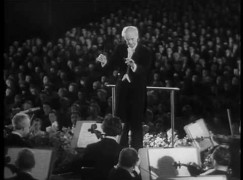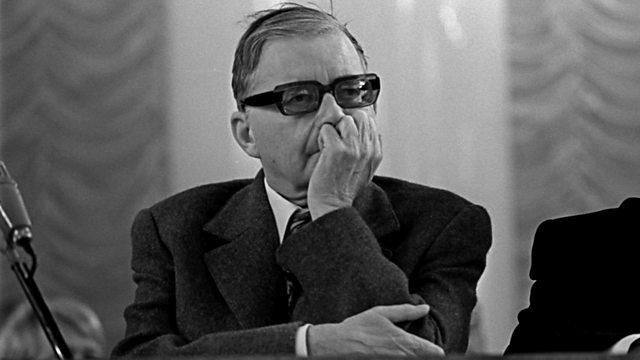‘I know no bad works by Bach’
mainThe quote is from an interview with Ton Koopman, Dutch early master, who turned 75 this week.
But is it vald?
Is it possible that a composer did not leave a single work that fell so far below his usual standard that it qualifies as bad?
That would be inhuman, no?

Or just typical of classical music hagiolatry?






I think some of the sonatas for violin with keyboard (that is NOT the unaccompanied works) are a bit sausage-machine like.
I need to look up with Carlos Kleiber said about JSB, but he was no fan
Kleiber:
“Bach, all by itself, is already a leaky water faucet to listen to. Busoni and Co. merely intensify the bleep bleep charm. Playing it oneself (trying to, even) is, on the other hand, wonderful fun. But when some whizz rattles off the welltempered, what just barely keeps one awake is the exciting thought “this is very difficult and I’ll never be able to do it. But I’d enjoy doing it if I could. Which I can’t.” Don’t quote me, I’m NEKULTURNY.”
Why conductors, even being great as such, feel the need to pee at the pedestal of a grand statue, like a little angry dog, never stops to be amazing.
During the war I had neighbours with your last name. They probably heard a lot of Bach through the walls.
And Kleiber couldn’t play the piano to save his life!! Much as I adored this conductor he wasn’t always right (or upright, if I can put it like that!). He liked “Fledermaus” and not Bach? That says it all.
Since when is Carlos Kleiber the ultimate authority on everything he expressed an opinion about?
Many of his pronouncements, however entertaining or even thought provoking, were often self-parody or provocations.
There are many other conductors who have been immersed in Bach’s music and whose related insights can be way more authoritative.
I love Kleiber (and I agree with him re: Busoni and Co.), but on the whole this is a crackpot statement from a genius conductor who should have known better than to make it.
Love Bach, but can be a pain to play on the classical guitar. Did Mike Ryan ever have us play Bach? Can’t remember. Go Dons!
Try Viktoria Mullova & Ottavio Dantone‘s recording …
Havent come across one myself as yet, I have to say.
Depends which Bach…
I agree that Bach is sublime. With him, I don’t believe it’s a case of hagiolatry (defined as undue veneration of a famous person), but it’s a good word to know, these days!
I go for the hagiolatry.
Me too. (Oh, unfortunate comment!). I cannot think of anything by Bach that isn’t magnificently crafted but, of course, it’s not always ‘accessible’. May I commend “All of Bach” – the Netherlands Bach project (to which you can donate): listen for yourself.
https://www.bachvereniging.nl/en/allofbach
Name one!
I would say the same of Handel , Shakespeare , Leonardo , Mozart, Vermeer , Rembrandt , the list is not short . We are lucky to be in touch with such marvels of human creation .
Not to mention John Milton. Mozart is the most accessible on your list.
Dante?
“Is it possible that a composer did not leave a single work that fell so far below his usual standard that it qualifies as bad?
That would be inhuman, no?”
Yes. He was an alien, of course. Much more plausible than him being good at burning stuff.
Brettermeier, that is one of the better comments I’ve ever read. High-Larry-Us!
Oh please. It’s a kind of virtue-signaling by an artist whom it costs nothing: by being seen to (basically) worship Bach, he shares a bit of the glory. Give it a rest. Bach wrote plenty of forgettable music, and since many of his works are lost, no such assessment can be realistically made.
I am puzzled by the use of “virtue-signalling” as a slag-off. What’s wrong with signalling that you are on the side of virtue?
What is probably meant, is the easy way of showing-off one’s ‘knowledge’ and ‘understanding’ of Great Art by lauding what everybody is already lauding to death. It is like performers in interviews going on great length to praise Beethoven or Chopin for this or that quality that everybody knew already since childhood – repeating conventional superficial information which does not need any mental exercise or even, interest.
Your interpretation of “virtue-signalling” makes no sense in this context.
A distinguished musician goes to heaven and is greeted by St.Peter, who welcomes him and says that it is the day on which God has his office hours and is eager to welcome the musician in person. They go down a long hallway to a beautifully appointed office, where there is an old gentleman with a beard, sitting behind a desk, listening to a Mozart piano concerto.The musician says how deeply moved he is to be welcomed by God, but says he is surprised to see God listening to a work of Mozart. “I would have thought you’d be listening to something by Bach.” There is an awkward pause before God says, “But I am Bach!”
You gave me the best laugh of the day!
Thank you. By the way, I hope I go in the same direction even if it means meeting the venerated Stockhausen.
Stockhausen is definitely in the other place, and enjoying himself there.
some 200 cantatas that Bach wrote are a total bore.just as half of the Brandenburgs.Just as some 5 suites for cello out of the 6.just as 3 of the suites.Many other works are gracious & divine.
…in your opinion.
His cantatas are one of the greatest contributions to western music.
My name is Scheibe. Johann Adolf Scheibe.
Brilliant! The ultimate in-joke for musicologists.
With all due respect, but this is a gravely insane comment. The Brandenburg Concerts, all of them, are master pieces of the utmost sophistication. There is no other instrumental corpus from the baroque era of that level.
Anything by Handel is better.
When you listen to Handel you may be lutening to the music he stole from many other composers.
“Inhuman”, i.e., lacking the character and qualities of a human being? Of course he wasn’t. “Superhuman”, i.e., having qualities and abilities far greater than those normally found in humans, yes, of course he was possessed of such. Such is genius. Beethoven was also so possessed, though he certainly, and I must think knowingly, wrote a few potboilers because he needed the money. And Mozart, though I can’t think of a ‘bad’ Mozart composition. And then, Ben Britten would happily have told you why everything Brahms wrote was lousy, which reminds us that there is no absolute in this matter. But I should think first of Bach and Mozart as two composers so soaked in the water of genius that what possessed them barred the composition of a ‘bad’ work. I don’t find that in the least surprising. In both those cases, I have long thought that the process of composition in each explains why. But that requires a fair amount of study of them, and that I shall leave for our blogger to do if he is sceptical.
Ben’s so-called ‘assessment’ of Brahms was due to his very restricted taste and understanding, and jealousy of Brahms’ ability to find ever new inventions with a common traditional language. Namely, Britten did the same as Brahms did: using a traditional language and saying personal things in it. Only, Brahms was much better, and less inhibited. Ben would – on regular intervals – take-up Brahms’ scores and play them through to check if it was indeed as bad as he had thought, and was always happily confirmed in his prejudice. This is typical behavior of someone filled with jealousy and spite.
Well, the question you’re asking is about Koopman’s opinion versus other people’s opinions: do you think such-and-such piece is bad?
I would say it is possible that Bach left nothing bad behind — not that he didn’t write anything bad necessarily, but destroyed it if he thought he had. I don’t know. I wasn’t there.
Brahms is famous for having burned half his output, for example; and I’ve never heard of any “bad” works by him, a la Beethoven’s “Wellington’s Victory.”
@Bruce: “I would say it is possible that Bach left nothing bad behind — not that he didn’t write anything bad necessarily, but destroyed it if he thought he had.”
I read somewhere that he didn’t want to waste manuscript paper, or any kind of paper — so if he wrote something he didn’t want to keep, he would just give it to his wife who wrapped the fish, or bread, or whatever, in it that she bought at the market…
Find that documented somewhere. Little to nothing is known about his personal or domestic life.
Triumphlied may be Brahms’ Wellington’s Victory–not that I don’t enjoy it.
I never liked Bach’s ‘Musette’….
https://www.youtube.com/watch?v=cBjjfUexPCA
A work for his beginner keyboard students.
That’s a poor excuse… 😉
There are serious doubts whether the Musette was composed by J S Bach. It was included in his book for Anna Magdalena. We know for a fact that some of the works contained therein were not his.
https://www.bach-digital.de/servlets/solr/select?q=%2BobjectType%3A%22work%22+%2B%28musicrepo_work01%3A%22126%22+musicrepo_work02%3A%22126%22%29&fl=id%2CreturnId%2CobjectType&sort=musicrepo_worksort01+asc&version=4.5&mask=&start=3&fl=id&rows=1&XSL.Style=browse&origrows=25
I love Bach. And he is undoubtedly one of the greatest of composers.
But IMO several of the keyboard suites are dull, and throughout these suites Bach uses a similar theme which becomes boring when listened to in variations over and over again.
It’s the timeless quality of the suites which is their appeal, and variations are there to remind us that there are things in life which remain the same while appearing in ever different forms.
One of the most inspiring classical music guides I read and reread is B.H. Haggin’s The Listener Musical Companion (1991). He more or less dismisses all of Bruckner, Elgar and Sibelius as dull, derivative or vulgar. Bach gets a full chapter in which he sieves the master’s vast opus between inspired or merely virtuosic craftwork. I lack Haggin’s expertise and discerning taste, but I fully agree to his assesment that The Musical Offering is one of Bach’s least inspired works.
um…
Just for the 6 part fuge the musical offering shoulf be regarded as inspired work…
I have always thought that that 6-part Ricercar that Shlomo mentions is the single greatest work of the entire Baroque era.
Thanks for mentioning it, Shlomo!
Nonsense.
Haggin’s “The Listener’s Musical Companion” is certainly interesting reading (and I own and have read a number of its editions), but let’s not forget that Haggin was mentally disturbed.
Whether he knew it or not (and I suspect he didn’t as his mind was on other things such as paying his bills by way of doing his job), JSB’s music formed the creative wellspring from which the fabled spirit of German musical art was sprung from a line from him up to Bruckner and Wagner. And as NL has recently reminded us on this blog, Furtwangler was the high priest of telling us what it is all about. Was JSB vain enough to be aware that he was an essential genius to Western culture? IMO I don’t think he was aware of it.
He had not the faintest idea. In his time, ‘musical nationalism’ did not exist. Serious music making was entirely European: JSB used Italian, French and (north-) German traditions to furnish his own ‘style’ which was not a style at all but a personal handling of a very general language.
I saw Ton Koopman perform in Hong Kong once. The performance was in the cultural centre in Tsim Sha Tsui and I ran into to him on the Star Ferry, crossing from Hong Kong Island. The Star Ferry is a wonderful way of getting between the two, but I was puzzled by his already being dressed in white tie. I exchanged pleasantaries with him, but refrained from asking why he didn’t change at the concert hall. Still puzzled. Great performance, though.
I never found Koopman a very musical performer: rather a representative of oldfashioned early music modernism, which means: often hurried tempi, cut-off cadences, no rubati and no suggestion of rhethoric or ‘expression’, the music sterilized to its skeletons as if the baroque masters always preferred a dead rendering of their meticulous scores. In other words: too rational.
Koopman is right, of course. But it’s true if lots of great composers. Can you think of any mediocre works by any of the following: Machaut, Dufay, Ockeghem, Obrecht, Josquin (*especially Josquin), Lassus, Victoria, Tallis, Byrd, Dowland, Monteverdi, W. Lawes (quirky, yes, but never mediocre), Charpentier, Couperin, Rameau, … ?
Interestingly, it is quite difficult to detect ‘mediocrity’ or ‘bad taste’ in pre-19C music, because we don’t know the vulgar music of its time. For instance, if we did not know the primitive entertainment music of early 20th century, we would understand Mahler very differently.
Andrew writes: “Can you think of any mediocre works by any of…”
Some of us would struggle to think of any music by some of these people, let alone mediocre work.
What blows my mind about the music of JS Bach is that:
he wrote it all by hand, and probably a lot of it by candlelight (when he wasn’t working on creating “other things” like those 20+ children)
Ka-POW!
Recent research has unveiled that he had much help from family members and neighbours, while the latter were helpful with procreation.
Regarding the work on procreation, I look up to Maria Barbara and Anna Magdalena.
I’d say St. John’s passion is less elaborated than St. Matthew passion. You can clearly feel the evolution.
Bach veered between the highly competent and the absolute genius.
This seems to be the most apt and shortest description of B’s output.
Please add facility to share by email, I don’t do social media platforms. Many thanks
You just used it. Ha
Lost in this discussion is the matter of performance. A bad performance of any of Bach’s works can make it sound less than inspired and lead a listener to dismiss that work out of hand.
Indeed. And a mechanical rendering is often invited by the regularity of the baroque style which disguises the performer’s lack of musicality.
Like Esther Cavett, I’m lukewarm about the concertante sonatas for violin and keyboard. Even Menuhin and Lndowska can just hold my interest in the E major they recorded at his instanc for RCA. They performed it and three others at a joint recital in New York that was recorded. The same is true of the viola da gamba and keyboard sonatas for me, even from maisky and Argerich.
strictly speaking, yes, it is possible, and it’s not inhuman. C.G.Jung made an beautiful study about it in ‘Poetry and Psychology’. He call it ‘visionary mode of creation’.
I think Jung was on to something. Truly interesting or great creation does not stem from the intellect but from the subconsciousness, and artists who are able to mine it, find a way to connect with a natural creative process.
To me, there are three composers who never wrote a single bad work: J.S. Bach, Mozart and Brahms.
Agreed. It makes me think of composers who in spite of exhaustive efforts, never wrote a single good work, as in the past someone like the 18C Joachim Alzheimer (now completely forgotten) or 19C Raff, or 20C [redacted] and [redacted]; and in our own time the immensily overrated [redacted].
As of quality: there is this rather absurdist story about Brahms who was once, after a performance, asked by an audience member how he could write again and again ‘such beautiful adagios’ – upon which B answered: ‘Oh, but my publisher just orders them like that’.
I totally agree with your Raff statement; there isn’t one ounce of inspiration in his music. As for Alzheimer, I never heard of him. Do you have a link with some info on him or his music?
Unfortunately, the man is totally forgotten, disappeared, with his concerti grossi, into oblivion without a trace – except as a warning symbol.
There are many works by Raff on YouTube, accompanied by comments like, ”Far greater than Brahms!” I wish I could hear what they are hearing! Another is von Herzogenberg. I think better than Raff, but Symphony #1 is just terrible and #2 listenable but boring.
Interestingly, such composers are very able and have sophistication. But somehow their music does not ‘speak’, everything remains at the surface. As Stravinsky said of Maximilian Steinberg, ‘star pupil’ of Rimsky-Korsakoff: ‘…..one of these ephemeral, prize-winning, front-page types, in whose eyes conceit for ever burns, like an electric light in daytime’.
But in premodern times, the general level of craft as was taught in the conservatories, was such that also without much musical talent, people could produce capable work. It says something about the meaning of a cultural tradition.
PS:
I apologize for my comment about Steinberg: he was not as bad as his reputation has suggested – mainly because of Stravinsky’s comments. He was a ‘conservative’ composer, somewhat like Glazunov, and a respected teacher (among others, of Shostakovich). His Soviet works contain quite unpleasant social realist bombast….
https://www.youtube.com/watch?v=VfQKxAPn8Yk
… but his earlier pieces have – apart from competence – a musical charm:
https://www.youtube.com/watch?v=i-VOH3YlfOA
https://www.youtube.com/watch?v=gojEOVAKBqc
In the twenties he wrote a religious choral work but it went into the drawer due to Soviet prohibitions. It was successfully premiered in 2014 and it is an inward, beautiful piece:
https://www.youtube.com/watch?v=DCsufsfLcZI
I think he was better than, say, Raff, although it is not very ‘deep’ music.
This is a Raff, competent but – apart from some nice moments – superficial and banal:
https://www.youtube.com/watch?v=76X9SW31fXY
However subjective artistic judgments are, they are not entirely subjective.
https://en.wikipedia.org/wiki/Maximilian_Steinberg
Would you include Mozart Juvenilia in the “never a bad note”?
Bach and Mozart, in my view, wrote a lot of formulaic music.
In those times, music was a craft first and an art second, due to the patronage system. And the craft was on a high level, as so many other crafts were: architecture, painting, furniture, etc. So, every composer began as a craftsman. Only in the 19th century ‘the composer’ became an artist standing on his own feet, socially and artistically, and had to produce ‘masterpieces’ with every opus.
It is an opinion. You should allow others to have them instead of questioning whether they are, ahem, “vald.”
Thanks to J. Knecht for his post of October 5. Hoping that he is Joseph Knecht, Magister Ludi, of Hermann Hesse’s “The Glass Bead Game”, and with regards to Fritz taegularius, the old Music Master, and especially Elder Brother and the bamboo garden, whom I think of often.